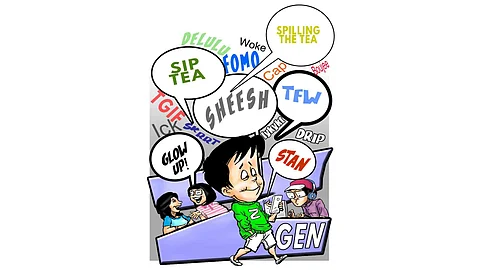
- NEWS
- the EDIT
- COMMENTARY
- BUSINESS
- LIFE
- SHOW
- ACTION
- GLOBAL GOALS
- SNAPS
- DYARYO TIRADA
- MORE

If you’re feeling out of the loop when it comes to understanding Generation Z, you’re not alone.
This generation has grown up in a world where social media and technology are second nature. Their language, which is filled with slang, abbreviations and evolving expressions, can sometimes feel like deciphering a new dialect entirely.
For Gen Z, communication is all about speed and creativity. They’ve crafted a lingo that’s short, snappy and heavily-influenced by the digital platforms they frequent — think TikTok, Instagram, and X.
Terms like “FOMO” (fear of missing out) or “sksksk” (a keyboard mash often used to express excitement or laughter) are just the tip of the iceberg.
New words and phrases are constantly emerging, and keeping up can feel like a full-time job.
What sets Gen Z apart from previous generations is their ability to use language as a tool for building identity and community.
Words like “stan” (a blend of ‘stalker’ and ‘fan,’ referring to an extremely enthusiastic fan) or “flex” (to show off) aren’t just casual slang; they’re part of a cultural currency that connects them with their peers.
It’s a language born out of the need for authenticity, individuality. One notable aspect of Gen Z’s communication style is its inclusivity and the way it embraces diversity. They’re not afraid to break down traditional language barriers, blending words from different cultures, internet memes and even their favorite TV shows and music.
This melting pot of influences reflects an open-minded worldview and the globalized society they’ve grown up in.
But it’s not all about quirky words. Gen Z’s language also reflects their values. Phrases like “cancel culture” or “woke” highlight their awareness of social issues and their willingness to hold others accountable.
They use language as a tool for activism, spreading messages about climate change, social justice and mental health across their networks at lightning speed.
Here’s a list of Gen Z slang terms and their meanings:
Glow up - A makeover or transformation from bad to good.
Cancel culture - A form of shaming the actions or opinions of a public figure, company, or organization.
Stan - A combination of “stalker” and “fan,” referring to an extremely enthusiastic fan.
Ghosting - Cutting off communication without explanation, often in the early stages of a relationship.
TFW - “That feeling when.”
TGIF - Thank God It’s Friday — commonly used by workers.
Sip tea - An alternative to “spilling the tea,” meaning to sit back and listen to the gossip.
Iykyk - Stands for “if you know, you know,” referring to an inside joke or something specific to a community.
Woke - Being politically and socially aware.
Drip - Another term for swag; refers to a cool or stylish trend.
Sheesh - Used to hype someone up, especially when they’re looking good or doing something impressive.
Periodt - Adds emphasis or intensity to a statement, similar to saying “and that’s that.”
Main character - Describes someone who is charismatic or well-liked, or someone who is making a scene.
Bussin’ - Used to describe something that tastes delicious.
Skrrt - Mimics the sound of screeching tires, used as an interjection, often to interrupt or signal excitement.
Understood the assignment — Used to praise someone, often seen on social media when someone perfectly executes a task or role.
Boujee - Describes something that is rich, luxurious or fancy.
Cap - Means lying or faking; “No cap” means no lie.
Delulu - Short for delusional; describes someone with unrealistic or irrational beliefs.
Ick - A feeling of disgust towards someone or something.
For those feeling a little FOMO about keeping up with this evolving lingo, the best advice is simple: dive in. After all, language is a reflection of the world we live in — and Gen Z is just using a different level of authenticity of voice.
